#formalization
Explore tagged Tumblr posts
Text


lingering a little longer
#deltarune#kris dreemurr#ralsei deltarune#susie deltarune#deltarune spoilers#deltarune chapter 4#comic#this scene has been burned into my mind since the second i saw it i am reading Everything into kris hugging him of their own volition#this is my formal apology to ralsei for all but ignoring him after ch2. i love you my son. my beautiful baby.#edit: forgot everything looks small on phone. so i rearranged it
8K notes
·
View notes
Text



knife and fork..?
#cookie run kingdom#cookie run#shadow milk cookie#burning spice cookie#mystic flour cookie#eternal sugar cookie#silent salt cookie#my art thing#why is he so formal are they in high class restaurant or smth
8K notes
·
View notes
Text
Tim, abruptly standing up in shock: Wait, I just realised that Damian will graduate highschool in 2032
Damian, rasing a brow: Yes, ofcourse? As I am currently in fourth grad-
Jason, spitting out water: What the fuck? 2032?
Steph, pointing accusingly: That's not a real graduation year you made that up!
Dick: I think I just threw up in my mouth a little
Duke, with his head in his hands: Does anyone else feel both their feet in the grave? I graduated this year!
Dick: Feet? More like my entire body, I finished high school years ago!
Cass: Guys I think Bruce is crying
#Tim: I feel so far deep in the grave that i feel like Jason!#Jason: hey now#tim drake#damian wayne#jason todd#dick grayson#batfam#batman#cassandra cain#duke thomas#stephanie brown#nightwing#red hood#red robin#signal dc#incorrect batfamily quotes#batfamily#batfam incorrect quotes#incorrect batfam#incorrect batman quotes#robin dc#dc comics#dc#source: my cousin will graduate in 2031 and this was my reaction#I mean#they're being too optimistic by thinking that Damian WILL graduate high school tbh it's a robin curse to never be able to complete#formal education
15K notes
·
View notes
Text
The power set of facts yields innumerable histories.
Constraining History by Constraining Facts.—The instability of facts—that the world can be decomposed into facts in various different ways—is another sense in which history is infinite (in addition to the sense in which we can construct an infinitude of formal facts about the past). As the natural numbers can be decomposed into more subsets than there are natural numbers, so too the events of history can be decomposed into innumerable facts, and these facts can be assembled into more histories than there are events in history. That no type theory was ever imposed upon facts, attempting to arrange them hierarchically according to their complexity or extent, is a fundamental ambiguity of science, though an understandable ambiguity in at least a couple of ways. It is understandable insofar as rectifying this ambiguity would likely undercut the results of science in a way much like the use of a constructive logic undercuts much classical mathematics—and for similar reasons. Non-constructive thought, or what Torkel Franzén called classical eclecticism, gives a free hand in methodology, whereas all forms of constructivism—intuitionism, predicativism, finitism—involve some principled constraints on methodology, and a constraint on method will ultimately mean a constraint on results. A type theory for facts would constrain the results of science. And the absence of a type theory of facts is further understandable insofar as we don’t possess the formal framework necessary to enforce a hierarchy upon facts. All type theories have become unmanageably complex. The type theory of Principia Mathematica required work-arounds like the axiom of reducibility, which seem flagrantly unnatural. (Mathematicians don’t use type theory, they use ZF or some similar axiomatization.) Some other formalization of facts, or their elimination, seems to be in order.
0 notes
Text
The Evolution of HRM in the Post-World War II Era: Expansion, Formalization, and Global Impact

The post-World War II period marked a transformative era in the development of Human Resource Management (HRM) in the United States. Coming off the heels of global conflict, American industry entered a "golden age" of economic expansion and leadership. During this time, HRM experienced significant changes, particularly in the formalization of its functions and the expansion of employee benefit programs. Despite these advancements, the field entered the 1960s with a persistent sense of low status and limited strategic influence, reflecting the tensions between the growing complexity of labor management and the struggle to assert HRM's importance within organizations.
This essay will explore the key developments in HRM after World War II, including the proliferation of personnel departments, the rise of employee benefit programs, and the formalization of compensation structures. It will also examine the broader global context in which American HRM thrived, while other industrialized nations, such as Germany, Japan, and Great Britain, grappled with reconstruction and recovery. Finally, the essay will address the paradoxical situation in which HRM found itself by the 1960s: more widely adopted yet still struggling for recognition and strategic relevance within companies.
The Expansion of Personnel Departments
One of the most significant changes in HRM after World War II was the widespread adoption of personnel departments within American companies. Before the war, HRM was not a common feature in many organizations. As data from Jacoby (1985) illustrates, in 1929, only 39 percent of companies with 1,000-5,000 employees had a dedicated personnel department. This number rose sharply during and after the war, reaching 62 percent by 1935-6 and 73 percent by 1946-8.
Several factors contributed to this expansion. First, the war itself necessitated a more organized approach to managing labor, as companies needed to maximize productivity while adhering to government-imposed wage controls and managing a workforce that included a growing number of women and minorities. Personnel departments became essential for coordinating recruitment, handling employee relations, and administering the new employee benefit programs that proliferated during the war.
Additionally, the post-war economic boom provided American companies with the financial resources to invest in more formal HRM practices. The prosperity of the period allowed firms to expand their workforce and develop more sophisticated labor management systems. Personnel departments became responsible for a range of functions, including hiring, training, performance evaluation, and employee welfare. This expansion reflected the growing recognition that effective HRM could contribute to organizational success by enhancing employee productivity and reducing turnover.
The Rise of Employee Benefit Programs
Another critical development in HRM during the post-war period was the proliferation of employee benefit programs. During the war, wages were subject to government controls, but employee benefits were not. As a result, companies began to offer a wide range of benefits to attract and retain workers without violating wage control regulations. These benefits included health insurance, pensions, paid vacation time, and other non-wage forms of compensation.
The post-war period saw these benefit programs become a permanent feature of American HRM. Companies recognized that offering attractive benefits could help them compete for top talent in a rapidly expanding economy. The growth of employee benefit programs also reflected broader social and political changes, such as the rising influence of labor unions and the increasing demand for job security and social welfare among workers.
The formalization of benefit programs also contributed to the professionalization of HRM. As companies developed more complex benefit packages, they required specialized personnel to administer these programs. HR professionals became responsible for managing health insurance plans, pension funds, and other employee benefits, further institutionalizing the role of HRM within organizations.
The Formalization of Compensation Structures
In addition to the growth of personnel departments and employee benefit programs, the post-war period also saw the formalization of compensation structures. Companies began to standardize their pay scales and develop more systematic approaches to determining wages and salaries. This formalization was driven in part by the need to comply with government regulations, but it also reflected the growing recognition that compensation systems could be a powerful tool for motivating employees and enhancing organizational performance.
HR departments played a key role in developing and administering these compensation systems. They conducted job evaluations to determine appropriate pay levels for different positions, designed incentive programs to reward high-performing employees, and implemented wage structures that aligned with industry standards. By formalizing compensation procedures, companies aimed to create a fair and transparent system that would help attract and retain talent while promoting equity and productivity within the workforce.
The Global Context: American Leadership and International Recovery
The expansion and formalization of HRM in the United States occurred in a broader global context in which American industry emerged as the undisputed world leader. Much of Europe and Asia lay in ruins following the devastation of World War II, and while countries like Germany and Japan began to recover and rebuild their industrial capacity, the United States enjoyed a period of unparalleled economic dominance.
This global leadership allowed American companies to set the standard for HRM practices, and many of the innovations developed in the U.S. during this period were later adopted by companies in other parts of the world. For example, the formalization of personnel departments, the expansion of employee benefits, and the development of systematic compensation structures became key features of HRM in Europe and Japan as these countries rebuilt their economies and modernized their industries.
However, the post-war period also saw significant differences in how HRM evolved in different countries. In Germany and Japan, for example, labor relations were heavily influenced by government policies aimed at fostering industrial recovery and maintaining social stability. In Germany, the system of "co-determination" allowed workers to participate in company decision-making through works councils and union representation on corporate boards. In Japan, the concept of "lifetime employment" became a cornerstone of labor relations, with companies offering long-term job security in exchange for employee loyalty.
These differences highlight the ways in which HRM practices are shaped by national contexts and the specific challenges facing each country during the post-war period. While American HRM thrived in a relatively stable and prosperous environment, HRM in other countries evolved in response to the need for industrial recovery and social reconstruction.
The 1960s: A Period of Growth and Marginalization
Despite the significant advancements in HRM during the post-war period, the field entered the 1960s with a pervading sense of low status and marginal importance. By the mid-1950s, nearly every medium-to-large-sized company in the United States had a personnel department, yet HRM struggled to assert its strategic relevance within organizations.
One reason for this marginalization was the perception that HRM was primarily an administrative function, focused on compliance and employee welfare rather than strategic decision-making. While HR professionals played a critical role in managing day-to-day labor relations and administering benefit programs, they were often excluded from the higher-level discussions that shaped company strategy. This limited the ability of HRM to influence broader organizational goals and contributed to its reputation as a secondary function within the corporate hierarchy.
Additionally, the rise of collective bargaining and union power during the 1950s and 1960s further diminished the strategic role of HRM. In many industries, unions took the lead in negotiating wages, benefits, and working conditions, leaving HR departments to implement and manage the terms of collective bargaining agreements. This adversarial model of labor relations contrasted with the more cooperative and strategic approach to HRM that had characterized the pre-war period.
Conclusion
The post-World War II period was a time of significant growth and formalization for HRM in the United States. The expansion of personnel departments, the proliferation of employee benefit programs, and the formalization of compensation structures all contributed to the professionalization of HRM and its integration into the fabric of American industry. However, despite these advancements, HRM entered the 1960s with a sense of marginalization and low status, reflecting the challenges of asserting its strategic importance in an era dominated by collective bargaining and union power. As the field continued to evolve, HRM would need to navigate these tensions and redefine its role in shaping organizational success in a rapidly changing economic and social landscape.
#HRM (Human Resource Management)#PostWorldWarII#Expansion#Formalization#GlobalImpact#IndustrialRelations#LaborMarket#EconomicGrowth#SocialAndPoliticalContext#HRMTransformation#Globalization#MultinationalCorporations#InternationalHRM#ComparativeHRM#HRMModels#BestPractices#HRMInnovation#StrategicHRM
0 notes
Text
With how RFK has been speaking about autistic people and his plans for them, I don’t want to hear FUCK against self-diagnosis ever again when shit like this directly demonstrates what formal diagnosis can lead to �� and there is worse to come, I guarantee. An autistic person’s choice to not be put on a Eugenics Hitlist is pretty fucking valid I’d say actually
#FYI I’m not preaching against diagnosis#I was formally diagnosed at 10#But this shit demonstrates deep horrific flaws in the system#autism#autistic#actually autistic#ableism#american politics#us politics#diagnosis#self diagnosis#fuck rfk jr#rfk jr
6K notes
·
View notes
Text

I love the headcanon that Jean thinks Andrew is kinda spooky like a blank-eyed child in a horror movie or something.
#aftg#jeremy knox#jean moreau#andrew minyard#all for the game#my art#fanart#comic#where are they? no clue. I just wanted to draw formal wear
6K notes
·
View notes
Note
Consider: Post-canon Zuko wakes up in the body of his childhood self, the morning of That War Meeting. Would he still speak against the plans, knowing his fate? What do you think he would do differently the second time around?
"Turned away at the doors, Zuzu?"
"Shut up, Azula," her brother sulked. But sulked weirdly, after staring at her too long and too wide-eyed, not like she'd surprised him but--
But like he hadn't expected her to be there. At all.
He turned away. ...He turned back. "Hey, Lala? Do you think you could help me practice that one set?"
He didn't meet her eyes.
She narrowed hers. "Which set?"
"The one I'm bad at."
She scoffed. Pushed away from the wall she'd been leaning against. "That's all of them, Dum-Dum."
He didn't shout or stomp or yell about the nickname. His lips twitched.
"It's okay," he said. "If you're afraid you won't be a better teacher that my instructor..."
It was the most obvious manipulation ever.
Perhaps if he proved an adequate firebending student, she'd work on his courtly survival skills next. Honestly, it was good that not even Uncle Gets-Cousins-Killed had been fool enough to take Zuko into that war meeting. She could only imagine how terribly that could have gone.
"Keep up," she said, and turned her steps towards the training grounds.
He did. There, and during the katas she ran him through.
Azula kept her eyes narrowed.
"Hey," he asked, "do you know how to bend lightning yet?"
As if he could have missed it, if she'd been able to get more than sparks. "I will soon," she said.
"You will," he agreed, and flowed through his next set. The one she'd only just mastered.
Father didn't notice how weird Zuzu was being. Uncle never noticed anything. Zuko ate dinner and asked a servant for seconds and didn't stutter or flinch or lose his appetite when father asked, coolly, what he'd done with his day. Azula's shoulders tensed, because one mention of how she'd squandered her own training time teaching him--
"Azula hogged the training grounds. For hours," Zuzu scowled, exactly like a petulant thirteen year old.
Exactly like he hadn't been acting all day.
By the time Father was looking her way, Azula had her usual smirk in place. "I'm sure there would be room for both of us," she said, "you're not afraid of a little friendly fire, are you, brother?"
Zuko sulked. And ate his seconds, like he was enjoying each bite. There was something in his eyes, like a joke no one else was getting.
---
Father died that night. A heart attack. There were the faintest of burns to either side of the treacherous organ; the royal physician hypothesized that he'd grabbed at his chest, fingers burning hot in his final moments; so hot they'd only exacerbated the problem.
The royal physician would never have been brought any victims of lighting strikes. Those that occurred in the capital did not generally require a doctor in the aftermath.
Zuzu ate a hearty breakfast.
He didn't order seconds. Azula gave him points, at least, for not being tacky.
---
The sages named Iroh as regent.
They named Zuko as Fire Lord.
"No," the tiny Fire Lord in his perfectly miniaturized Fire Lord robes said, sitting at the head of his war council. "We're not doing that. And I'll be reviewing all recent battle plans, as well. What's this I hear about a division of new recruits being deployed to the front?"
He did not mention how he'd heard of the 41st Division. No one asked.
"Prince Iroh, surely--" one of the generals tried to appeal.
The young Fire Lord's regent was looking as startled as the rest of them, for a moment. Then he sipped his tea, and smiled.
"Your Fire Lord is correct, of course. A change in our leadership--a change the other nations may mistakenly view as weakness--will necessitate a change in our strategy."
"Now," said their lord, "what, exactly, is our overall objective in this war?"
War, the new Fire Lord decreed, was not an end unto itself.
---
The new Fire Lord continued to have time, to pretend to be trained by her. Azula watched him. Adjusted her footwork. Did not tolerate, and was not offered, any commentary on who was teaching who.
"What did you do with my brother?" she asked, as they flowed from one set to the next. As her hands, poised to throw fire, just so happened to be pointed his way.
He missed a step. It didn't look like an act.
"I'm, uh. Right here?"
She didn't bother to dignify that.
He didn't bother to look worried about her hands, one movement off from a true attack.
He looked around, then grabbed her sleeve, and tugged her further from any walls that may hide ears. The royal family's private training grounds were wonderfully large, and wonderfully open.
"It's me," he said. "It's still me. Just. More of me? Longer of me?"
She narrowed her eyes. A familiar expression, by this point. "Explain."
"...I found the Avatar," he said. "And this is definitely his fault, but--but I guess it started at a war meeting, when I was thirteen."
Azula listened. It was a very Dum-Dum story.
#Zuko blue spiriting off to kill a man: mom would be so proud <3#Regent Iroh is left to wonder when his nephew learned to brew a decent cup of calming tea#and also managed to develop an impressively fleshed out plan to transition the Fire Nation economy from war to industry#Hakoda looking down at an invitation to meet for formal peace negotiations: why does it say to bring my children#Kya: he's only thirteen. maybe he doesn't know which way he swings yet?#in another timeline Kya would have been killed by the same crew that was instead tasked to carry this message#sssh let's pretend the timing works#Azula: no but really give me one good reason not to tattle on your time-traveling possibly-just-a-body-stealing-spirit self to Uncle#Zuko: you could tattle on me#or#I could tattle on him#Hey Azula. Did you know Uncle left a breeding pair of dragons alive?#egg field trip egg field trip egg field trip#avatar the last airbender#atla#Zuko#Azula#fire lord Zuko#ficlet
6K notes
·
View notes
Text
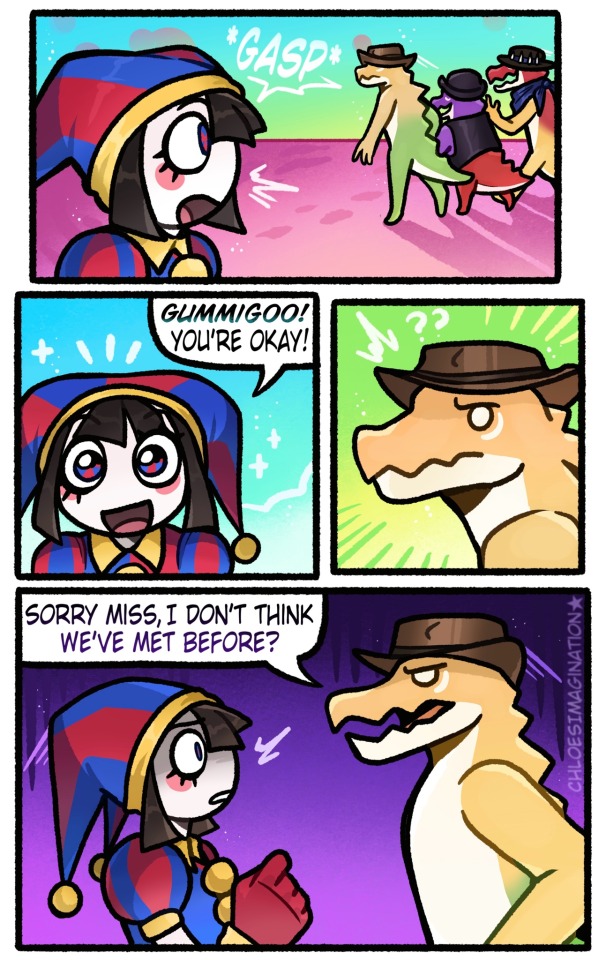
Pomni and Gummigoo reunite in TADC!
#myart#chloesimagination#comic#tadc#tadc pomni#gummigoo#pomni#digital circus#the amazing digital circus#tadc spoilers#tadc fanart#I would like to formally apologize to Pomni#I actually don’t think Gummigoo is dead#especially with Ragatha mentioned Caine reuses NPCs#but I also don’t think it’s the same Gummigoo or he doesn’t remember her#so gonna be so sad if they do meet again and Gummigoo just doesn’t recognize Pomni#Been awhile since I’ve done angst but I saw this comic so clearly I HAD to draw it#sorry to TADC fans 🩵#IDK if I’ll do mor stand alone TADC content but we’ll see 🙏🏾#my poor little heart won’t be able to take it if this happens BAHA
18K notes
·
View notes
Text
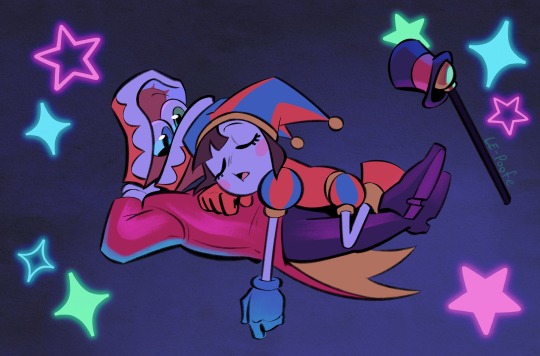
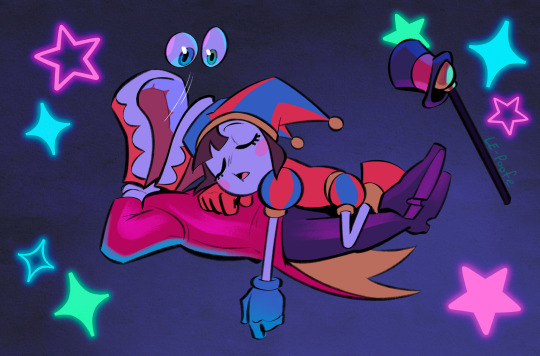
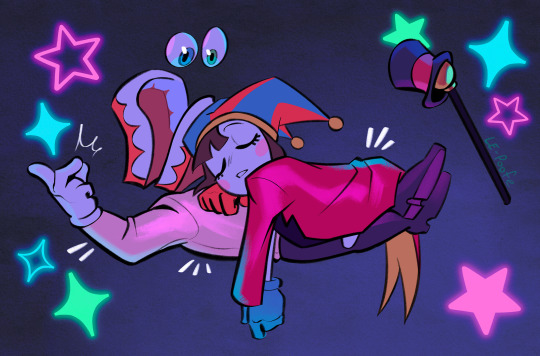
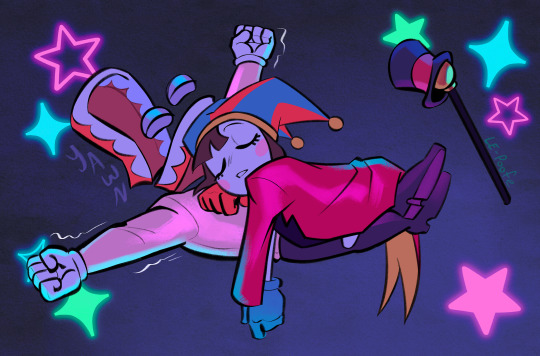
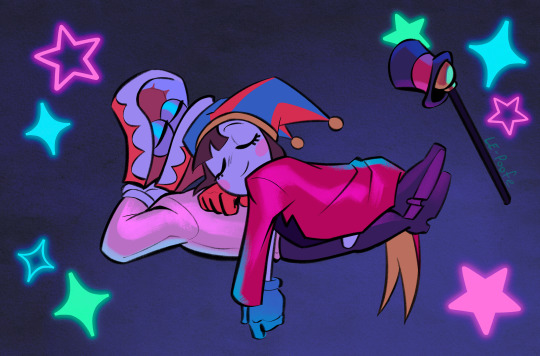
Coat blanket, that’s the whole post
#the amazing digital circus#tadc fanart#tadc pomni#tadc caine#tadc showtime#caine x pomni#pomni x caine#comic#the sillies are sleepy#before anyone says anything caine is yawning as a formality
14K notes
·
View notes
Text

back at it again with fancy butchfemme lesbian spirk
#I’ve officially drawn more genderbent spirk than good old regular spirk lmao#I’m imaging they’re going on a silly little date or like a space ball idk#I just wanted to draw them in more formal outfits#which I will be doing more of#star trek#star trek tos#star trek the original series#star trek fanart#s'chn t'gai spock#james t kirk#spirk#genderbend#my art
3K notes
·
View notes
Text
Halfway there with the portraits :D (Please don't spoil me ect ect but I've finished act 1 !!!!! And the Githyanki creche was insane omg)
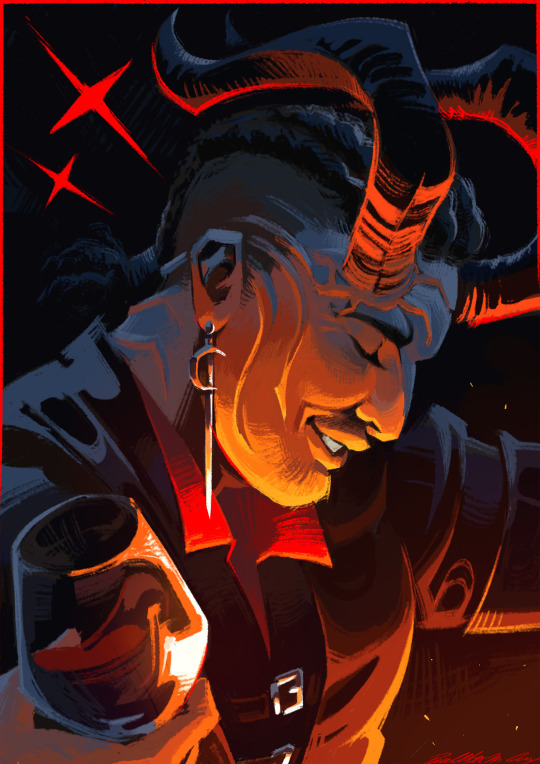
[COMMISSIONS]
when he first leveled up I was so baffled he was an occultist djdjdj which *intrigued* me 👀 and I really like that he becomes a demon goody two shoes ! That's fun ! And I love his design omg the horns !! He starts a bit boring, but quickly becomes so much more than what I expected :)
[Astarion] - [Lae'zel] - [Wyll] - [Shadowheart] - [Karlach] - [Gale]
Sketch and more yapping below vvv
But Wyll, my guy, you *have* to stop referring to yourself in third person- "the blade could use some sleep" just say you're tired omfg- it's the perfect blend of him being actually cool af, but annoying about it kfkf also I'm playing a french version of the game, and I know this pissed off the translators because that's not in the french subs- Also if you refer to yourself in third person in french, a way *way* more formal language already, that's not just a bit annoying that's straight up scary shit fnfkk
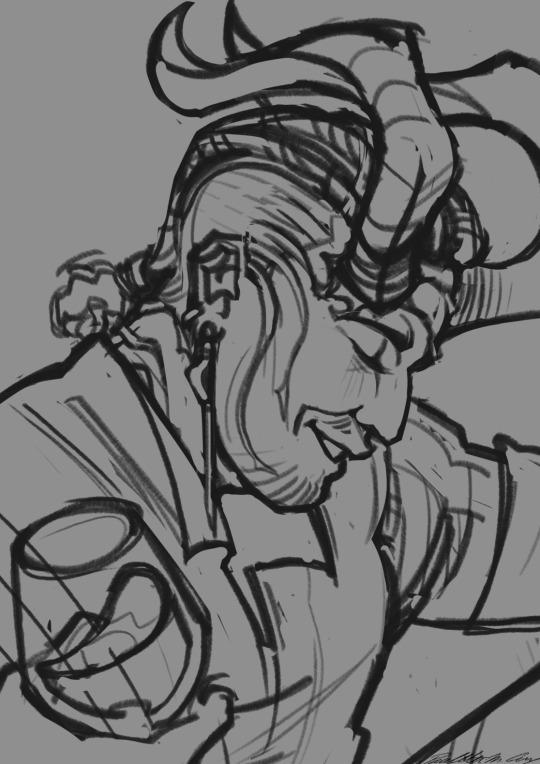
I am planning on doing all six main companions :) of course in order from my favorite to the one I feel most neutral about. Don't get me wrong I like them all (for now), but one had to be last-
#speaking of the french translation... can my companions stop using “vous” ??? that's so formal#10/10 when it comes to translating some names (like Wyll “Gardecorbeau” or “Ombrecoeur” these are great !)#but you'll never be friends with your companions they'll always keep you at arms length#would have been an interesting character choice for some but there's no way in hell Karlach is using 'vous' are you serious#anyway#wyll ravengard#bg3 wyll#baldur's gate wyll#baldur's gate 3#bg3#bg3 fanart#wyll fanart#painted portrait#digital painting#art#my art#digital art#fanart
3K notes
·
View notes
Text

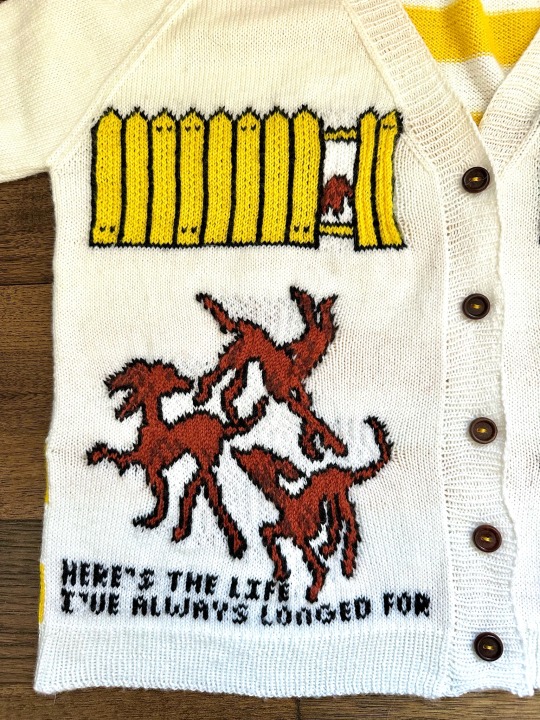

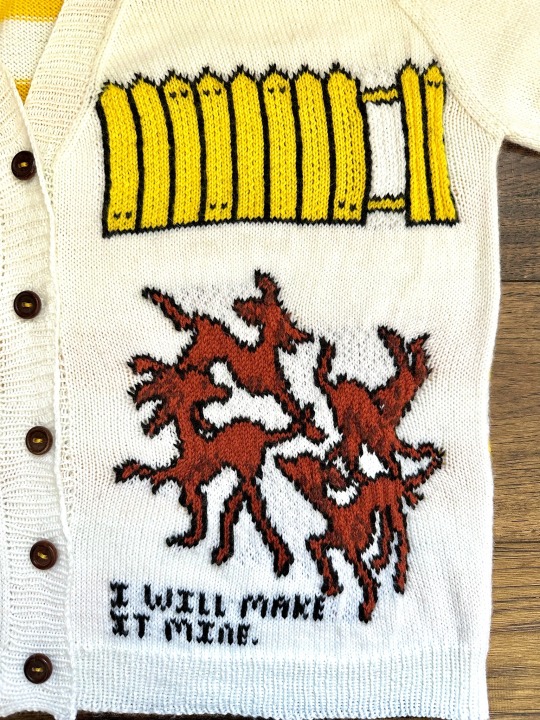
when art (below left, print by Anna Haifisch) inspires art (below right, follow up by @molabuddy) inspires art (above, hand knit cardigan by me)🐕


#knitting#knitblr#wip#this cardigan came together through the power of math and wishes and dandelion kisses let me tell you#sometimes my brain gets an idea (raglan flat stranded colorwork cardigan with side seams) and i’ll find no other sweaters quite like it and#i simply must plot and scheme and math until something magical happens. as such.#no formal pattern is written yet! but perhaps! someday in the future!#and yesssss return of my seed stitch elbow patches mwah mwah <3#i love when art inspires art though#anna heifisch#here’s the life i’ve always longed for#plus the bonus panel by molabuddy!! the stubborn hope it adds to the message is one i feel deep in my bones
4K notes
·
View notes
Text
Assimilating the World to a Logical Paradigm
The Procrustean Bed of Logic.—Since the bulk of the problem of logic is not in the process of deduction itself, but rather lies in the formalization of the problem that precedes deduction, almost any deductive framework will serve equally well. Whether we employ Aristotelian syllogisms, Stoic propositional logic, medieval terminist logic, or contemporary mathematical logic, is largely indifferent. While our modern logic is more advanced in virtue of having incorporated into itself the logical discoveries of the past twenty-five hundred years, it is not the be-all and end-all of logic. The formalization of a problem to the point at which it can be made to fit the Procrustean bed of logic is instead where we should seek the embodiment of human reason, but that would be formalization seemingly unmoored to logic, and that would deliver us over to a kind of rational vertigo—a disequilibrium of the reason, apparently without a handhold to steady ourselves. But not quite. We formalize a body of knowledge with an eye to how exactly it can be funneled into the strictures of logic, so our choice of logic for our deduction is not indifferent in this sense. The logic we employ governs the formalization we employ, so it is our choice of logic that ought to be attended by a rational vertigo, but here we have the spirit of seriousness to guide us, which, in the case of logic, is not the self-deception of ready-made values, but rather the self-deception of ready-made calculi. Given the calculus, our problem has been preemptively defined for us, as has its formalization; we have already surrendered our logical autonomy in our implied consent to the mode of formalization entailed by our chosen logic.
0 notes
Text

Permission to maim, sir?
#sth#sth fanart#silver the hedgehog#espio the chameleon#charmy bee#vector the crocodile#team chaotix#espilver#<- i guess#knights and poets au#roonies doodles#more knights and poets chaotix shenanigans bcs their dynamic makes me laugh really really hard#like its such a tense situation. they hate eachother but equally they also care for espio. so tolerance it is#vector and his son and his other son who is a noble and that sons weird intense guard dog who is only barely holding back from killing them#also sidebar but silvers called both silver and galahad with the latter being his formal way of address and also the most common#all this just because i find it really cute if espio eventually starts calling him silver when theyve started warming up to eachother
3K notes
·
View notes